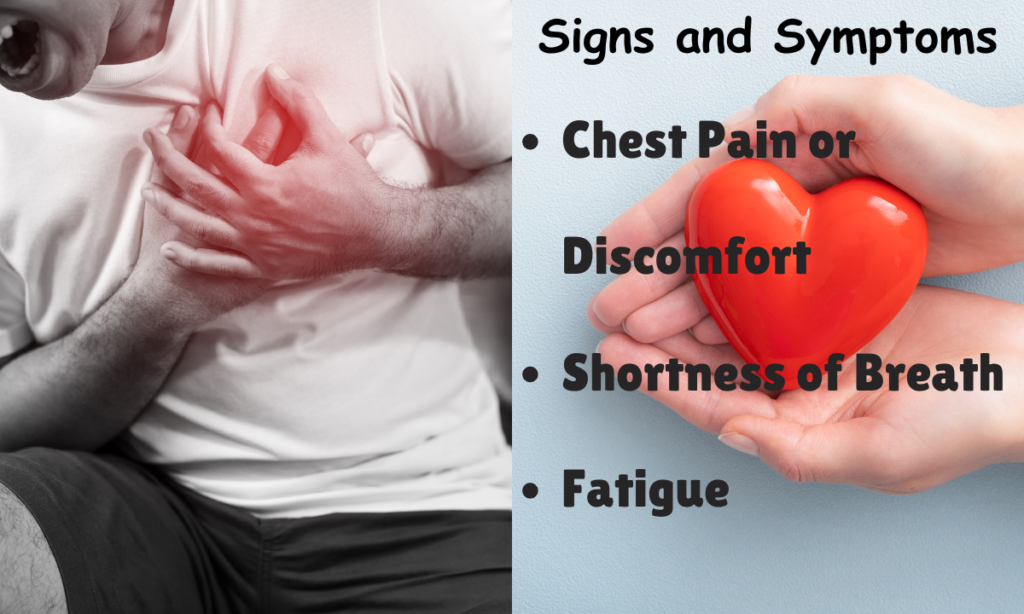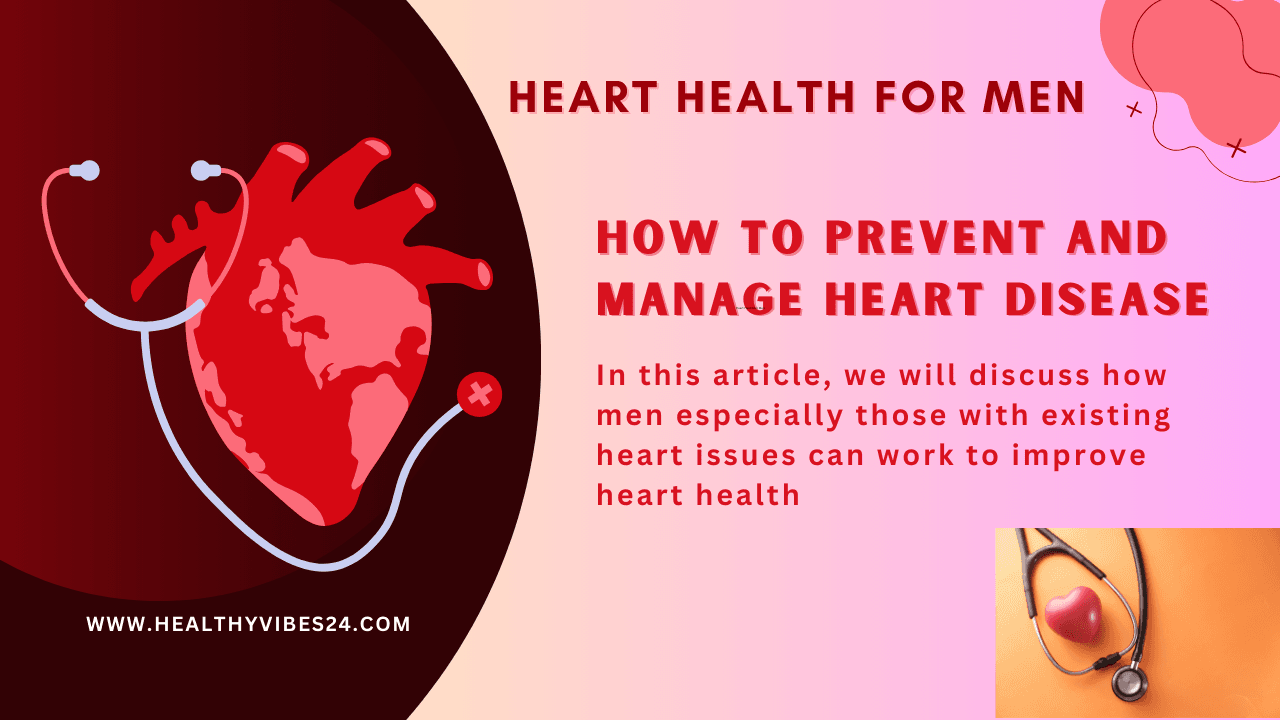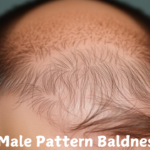- 1 Introduction:
- 1.1 Understanding Heart Disease:
- 1.2 Lifestyle Changes to Improve Heart Health:
- 1.3 Stress Management Techniques:
- 1.4 Regular Health Checkups:
- 1.5 Medications and Treatment Options:
- 1.6 Building a Support System:
- 1.7 Success Stories and Real-Life Examples:
- 1.8 Conclusion:
- 1.9 Call to Action:
- 1.10 Additional Resources:
Introduction:
Heart Health| Cardiovascular disease continues to be the major killer of men in many parts of the globe. In the United States, approximately 25% of all men will develop some sort of heart disease. This shocking fact should be clear for every man to understand the need to take care of their hearts. Knowledge of the essential nature of heart disease and the measures that may be taken to avoid heart disease is beneficial to increasing the number of healthy years of life and enjoy them to the fullest.
In the following article, we will discuss how men and especially those with existing heart issues can work to improve heart health. Whether you are looking for dietary and exercise modifications or medications to strengthen your heart and prevent future complications, this website is dedicated to providing you with the information and resources required to make your heart, and you, stronger.
Understanding Heart Disease:
What is Heart Disease?:
Heart disease comprises of a number of ailments associated with the heart’s muscles and chambers. The most frequent one is coronary artery disease when the vessels through which blood is pumped to the heart are narrowed or blocked. Others are heart failure, rhythm disturbances or arrhythmias, and diseases of the heart valve.

Signs and Symptoms:
people fail to realise is that men are not always easy to diagnose since they have different symptoms from women when it comes to heart diseases. Common signs include:
- Chest Pain or Discomfort
- Shortness of Breath
- Fatigue
Risk Factors Specific to Men:
It is fundamentally important to comprehend risks that will help to avoid dangerous situations. Key factors affecting heart health in men include:
- Age: This is particularly the case among men over 45 years of age.
- Family History: It is a known fact that the high prevalence of heart diseases in the family contributes to this risk.
- Lifestyle Factors: Smoking, taking of the wrong diet, and lack of exercise are some of the biggest causes of heart disease.
Lifestyle Changes to Improve Heart Health:
Balanced Diet for Heart Health:
Diet plays a central role in the prevention and management of heart diseases to the extent that medical experts do recommend taking certain types of diets. Aim to incorporate:

- Fruits and Vegetables: High in vitamins and minerals and has antioxidant properties Rich in vitamins and minerals. It is recommended daily serving of fruits and vegetable should be at least five servings per day.
- Whole Grains: It also reduced cholesterol level foods such as oats, brown rice and whole wheat bread.
- Lean Proteins: Choose fish, poultry and vegetarian sources of protein to improve your health.
Conversely, avoid:
- Processed Foods: It has high content of sugars and other unhealthy fats at the same time.
- Sodium: People with high blood pressure should consume <2,300 mg per day to help control blood pressure.
- Trans Fats: They are rife in fries, processed foods and are well known to skyrocket the lousy cholesterol.
Regular Physical Activity:
Introduction Physical activity is one of the strongest preventative measures against heart diseases. The recommendations made by the American Heart Association include: Try for 150 minutes of moderate aerobic exercise or 75 minutes of vigorous aerobic exercise a week. Some effective exercises include:
- Walking or Jogging: Easy measure for heart health and problems related to it.
- Cycling: An effective, low impact form of exercise that will aid the health of a person’s heart.
- Strength Training: Can assist in building muscles and it has good impact on metabolism.
Finally there are always people who cannot stick to formal workouts routine, and therefore just adding activity to your daily work life such as taking the stairs, walking during lunch break will also help.
Maintaining a Healthy Weight:
Being overweight is a well-documented risk to heart disease. So, as estimated by the CDC, obesity is a very strong determinant of heart diseases indeed. A good weight decreases pressure, makes cholesterol levels better, and reduces the chance of getting diabetes.
- Strategies for Weight Management:
- Set Realistic Goals: Ideally, one should lose 1 to 2 pounds per week: this will help you avoid hitting the wall’ while still shaving off those extra pounds.
- Monitor Portion Sizes: Remember portion sizes so that one does not take a lot of food.
- Keep a Food Diary: record your food consumption so as to notice habits and begin to make corrections where necessary.
Stress Management Techniques:
The Impact of Stress on Heart Health:
There is evidence that stress harms the heart. Quick flash: Stress – as well as prolonged, ongoing stress – may result in behaviours that are risky, for instance smoking, overeating, or lack of regular physical activity. Also, stress causes high blood pressure and also makes one have a disease of the heart.
Effective Stress-Reduction Techniques:
Stress management is something that can be successfully integrated in boosting heart health. Consider the following:
- Mindfulness and Meditation: Some studies report that even 10 minutes a day devoted to relaxation can decrease stress.
- Yoga: Incorporates walking, simple stretching, yoga postures and breathing techniques for calming one down.
- Breathing Exercises: Other basic methods include; taking deep breaths for four counts then releasing the air for six counts in order to bring about relaxation.
Regular Health Checkups:
Importance of Routine Checkups:
All these cases should be reported to the doctor as frequent health checkups are important for heart health check. Also early diagnosis of risk factors would make it easy to control them so that the development of heart disease does not progress.

Key Tests and Screenings:
Several key tests should be part of your routine checkups:
- Blood Pressure Measurement: Elevated blood pressure is one of the causes of heart disease.
- Cholesterol Levels: Lipid panel gives a clue of one’s risk level based on the HDL – cholesterol (good) and LDL- cholesterol (bad).
- Blood Sugar Levels: Usual, monitoring can enable one to diagnose diabetes which is a factor that may lead to heart diseases.
- Electrocardiogram (EKG): Can evaluate the pulse of the heart and see what kind of issues there are.
Medications and Treatment Options:
Common Medications for Heart Disease:
But if these modifications in life styles are not adequate prescriptions are very useful for the control of heart diseases. Some commonly prescribed medications include:
- Statins: Cholesterol levels must be brought down and the likelihood of heart diseases minimised.
- Beta-blockers: Reduce high blood pressure and regulation of heart beat.
- Anticoagulants: If you’re at risk for blood clots, take steps to lower your chances of them forming.
When to Consider More Intensive Treatments:
There are times though that more extensive approaches might be required. If lifestyle changes and drugs do not prevent new heart disease, angioplasty or bypass surgery may be suggested. Always consult with your doctor and discuss with him or her your options regarding the best way to move forward in the particular case of you.
Building a Support System:
The Role of Family and Friends:
A good support system can play a big role in how far you can go to get your heart in shape. Support from close kilo buddies is crucial: precisely cooking together, or walking as a team to stick to a homemade healthful meal.
Support Groups and Resources:
You may want to attend a support group or community organization of participants who are also concerned about their heart health. One reason is the sharing of ideas and traveling advice with others and there is social pressure to get things done. Some of the organizations that are available to assist you, provide with information and support includes the American Heart Association.
Success Stories and Real-Life Examples:
Inspirational Case Studies:
Its success stories of other men can really inspire people, especially if you want to run a business or do something similar. For example, John, a 52 year man with a heart disease diagnosis of coronary artery disease, made comprehensive changes to his lifestyle following a heart attack. They lost 30 pounds, began jogging, and moved to a Mediterranean diet. He followed up one year later and stated that the program made him stronger, and his doctor agreed, telling him that his cholesterol had come down.
Lessons Learned:
From John’s experience, we get to understand that they do not have to be aGer for people to change. One way or the other, any positive change is cumulative and can transform the heart considerably in the long haul.
Conclusion:
It helps men keep their hearts fit; especially those who have been diagnosed with heart disease. That means you can take many strides toward improving your heart health if you begin to understand the condition, adopt the proper diet and exercise regime, learn to control stress and get frequent check-ups.
Call to Action:
Do not wait until you hear a knock before you get out of your bed. Begin today by making an appointment for a physical exam, having your diet reviewed by a nutritionist or joining a support group. Your heart and the lifestyle that you want to pursue should be enough of an incentive for you to want to do something for your heart health.
Additional Resources:
To continue your journey toward better heart health, consider exploring the following resources:
- American Heart Association: Detailed information regarding the heart disease risk factors and its treatment.
- CDC Heart Disease Fact Sheet: Current statistic and protocols.
- Health Apps: You can share your duties of eating properly and exercising with apps such as MyFitnessPal or Fitbit.
To lower your chances of getting heart disease, you should follow these guidelines and make wise decisions on the way forward. Here again, it is important to remember that improving your heart health is not a race it is a long distance race and therefore you need to be patient. It helps a lot if anyone takes it slow and steady because the heart will surely be grateful.

1. What are the early signs of heart disease in men?
To lower your chances of getting heart disease, you should follow these guidelines and make wise decisions on the way forward. Here again, it is important to remember that improving your heart health is not a race it is a long distance race and therefore you need to be patient. It helps a lot if anyone takes it slow and steady because the heart will surely be grateful.
2. How can diet affect heart health?
Increased amount of fruits, vegetables and whole grains along with decrease in intake of high cholesterol foods, high blood pressure foods and high calorie foods also reduce cholesterol level, high blood pressure and being over weight respectively. On the other hand, foods containing processed meals, sugars and trans fats are believed to enhance the risk of heart diseases.
3. Is exercise really that important for heart health?
Yes! Regular physical activity strengthens the heart muscle, improves circulation, and can help lower blood pressure and cholesterol levels. Aim for at least 150 minutes of moderate aerobic exercise per week.
4. Can stress management really impact heart health?
Absolutely. The subjects who go through chronic stress have four potential risks; high blood pressure, poor dieting habits, and elevated risk of having heart diseases. Those practices are such as taking a walk, practicing some meditation and even practicing mindfulness that can also enhance the health of the heart.
5. What are some heart-healthy snacks?
Some examples of the healthy snacks would be avocado, fruits, vegetables dipped in hummus, Greek yogurt, nuts and whole grain crackers. These options contain the nutrients without the fructose syrups and hydrogenated oils that give foods their bad reputations.
6. How does smoking affect heart health?
Tobacco use is widely known to be a leading cause of heart diseases through negative effects of the substance on blood vessels and increased blood pressure and decrease oxygen level. Another shocking fact is quit smoking because this is one of the most effective ways towards a healthy heart.
7. Are there specific heart medications that men should be aware of?
Some are used to control cholesterol such as statins, other used to regulate blood pressure and heartbeat such as beta blockers, and others to thin the blood in order to avoid clot formation such as anticoagulants. It is always recommended that one should consult a physician on what can suit his or her situation.
















6 thoughts on “Heart Health for Men: How to Prevent and Manage Heart Disease”